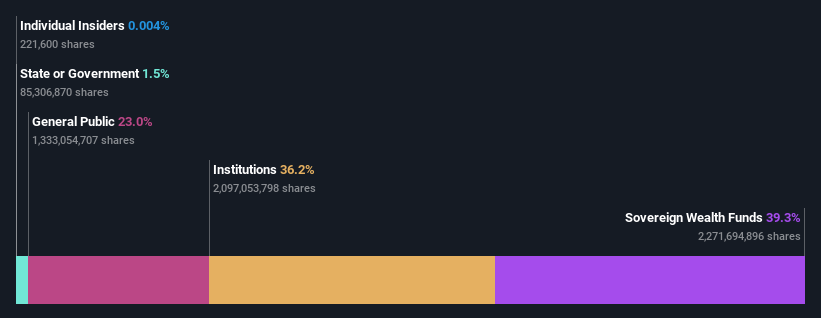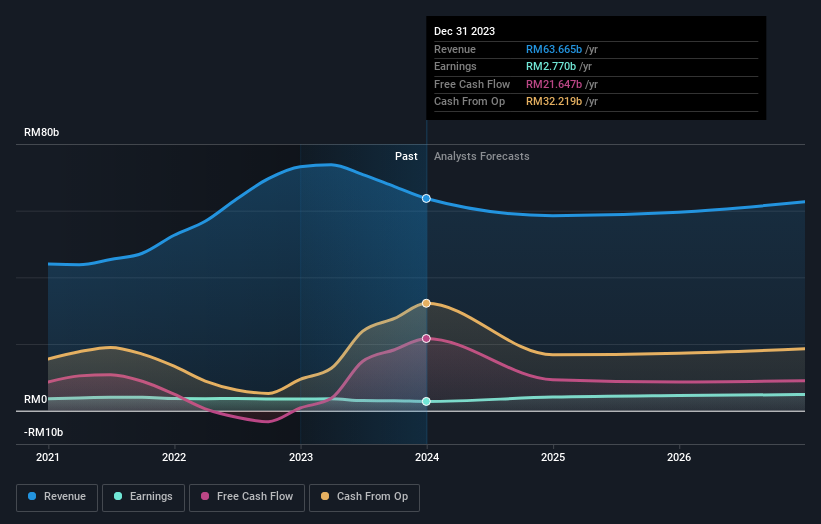Stock Analysis
- Malaysia
- /
- Electric Utilities
- /
- KLSE:TENAGA
Institutions own 36% of Tenaga Nasional Berhad (KLSE:TENAGA) shares but sovereign wealth funds control 39% of the company

Key Insights
- The considerable ownership by sovereign wealth funds in Tenaga Nasional Berhad indicates that they collectively have a greater say in management and business strategy
- The top 3 shareholders own 57% of the company
- 36% of Tenaga Nasional Berhad is held by Institutions
If you want to know who really controls Tenaga Nasional Berhad (KLSE:TENAGA), then you'll have to look at the makeup of its share registry. And the group that holds the biggest piece of the pie are sovereign wealth funds with 39% ownership. Put another way, the group faces the maximum upside potential (or downside risk).
Institutions, on the other hand, account for 36% of the company's stockholders. Institutions often own shares in more established companies, while it's not unusual to see insiders own a fair bit of smaller companies.
Let's delve deeper into each type of owner of Tenaga Nasional Berhad, beginning with the chart below.
See our latest analysis for Tenaga Nasional Berhad

What Does The Institutional Ownership Tell Us About Tenaga Nasional Berhad?
Many institutions measure their performance against an index that approximates the local market. So they usually pay more attention to companies that are included in major indices.
We can see that Tenaga Nasional Berhad does have institutional investors; and they hold a good portion of the company's stock. This can indicate that the company has a certain degree of credibility in the investment community. However, it is best to be wary of relying on the supposed validation that comes with institutional investors. They too, get it wrong sometimes. If multiple institutions change their view on a stock at the same time, you could see the share price drop fast. It's therefore worth looking at Tenaga Nasional Berhad's earnings history below. Of course, the future is what really matters.

Hedge funds don't have many shares in Tenaga Nasional Berhad. Khazanah Nasional Berhad is currently the largest shareholder, with 22% of shares outstanding. Meanwhile, the second and third largest shareholders, hold 18% and 17%, of the shares outstanding, respectively.
To make our study more interesting, we found that the top 3 shareholders have a majority ownership in the company, meaning that they are powerful enough to influence the decisions of the company.
While studying institutional ownership for a company can add value to your research, it is also a good practice to research analyst recommendations to get a deeper understand of a stock's expected performance. There are a reasonable number of analysts covering the stock, so it might be useful to find out their aggregate view on the future.
Insider Ownership Of Tenaga Nasional Berhad
The definition of an insider can differ slightly between different countries, but members of the board of directors always count. Company management run the business, but the CEO will answer to the board, even if he or she is a member of it.
Insider ownership is positive when it signals leadership are thinking like the true owners of the company. However, high insider ownership can also give immense power to a small group within the company. This can be negative in some circumstances.
Our most recent data indicates that insiders own less than 1% of Tenaga Nasional Berhad. It is a very large company, so it would be surprising to see insiders own a large proportion of the company. Though their holding amounts to less than 1%, we can see that board members collectively own RM2.6m worth of shares (at current prices). Arguably recent buying and selling is just as important to consider. You can click here to see if insiders have been buying or selling.
General Public Ownership
With a 23% ownership, the general public, mostly comprising of individual investors, have some degree of sway over Tenaga Nasional Berhad. While this size of ownership may not be enough to sway a policy decision in their favour, they can still make a collective impact on company policies.
Next Steps:
I find it very interesting to look at who exactly owns a company. But to truly gain insight, we need to consider other information, too. Take risks for example - Tenaga Nasional Berhad has 2 warning signs (and 1 which is a bit concerning) we think you should know about.
If you are like me, you may want to think about whether this company will grow or shrink. Luckily, you can check this free report showing analyst forecasts for its future.
NB: Figures in this article are calculated using data from the last twelve months, which refer to the 12-month period ending on the last date of the month the financial statement is dated. This may not be consistent with full year annual report figures.
Valuation is complex, but we're helping make it simple.
Find out whether Tenaga Nasional Berhad is potentially over or undervalued by checking out our comprehensive analysis, which includes fair value estimates, risks and warnings, dividends, insider transactions and financial health.
View the Free AnalysisHave feedback on this article? Concerned about the content? Get in touch with us directly. Alternatively, email editorial-team (at) simplywallst.com.
This article by Simply Wall St is general in nature. We provide commentary based on historical data and analyst forecasts only using an unbiased methodology and our articles are not intended to be financial advice. It does not constitute a recommendation to buy or sell any stock, and does not take account of your objectives, or your financial situation. We aim to bring you long-term focused analysis driven by fundamental data. Note that our analysis may not factor in the latest price-sensitive company announcements or qualitative material. Simply Wall St has no position in any stocks mentioned.
About KLSE:TENAGA
Tenaga Nasional Berhad
Tenaga Nasional Berhad engages in the generation, transmission, distribution, and sale of electricity in Malaysia and internationally.
Second-rate dividend payer and slightly overvalued.

